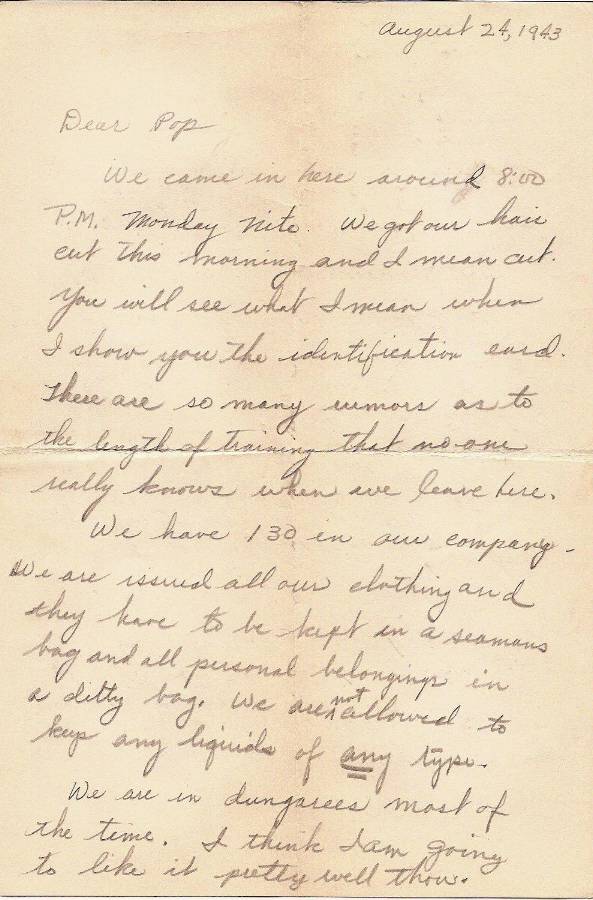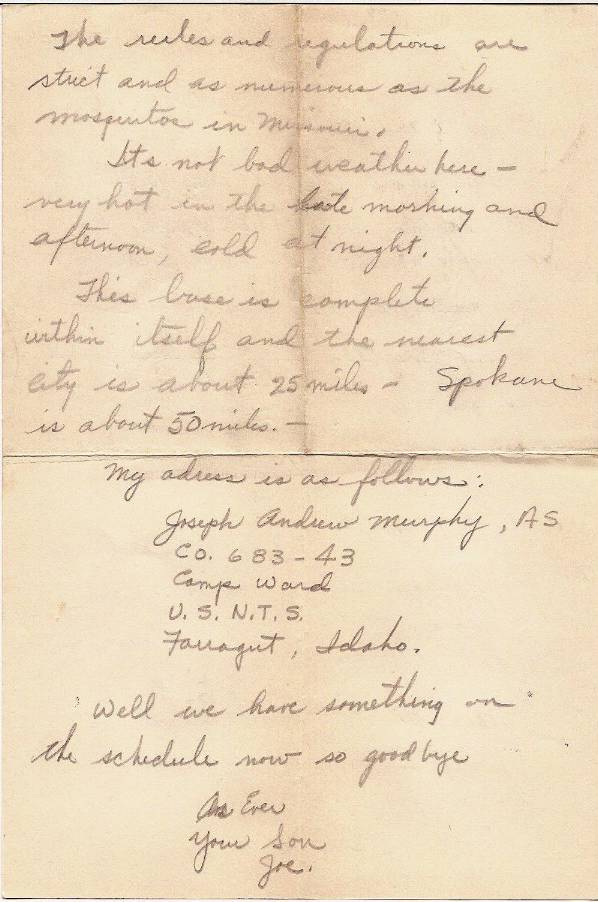My father never made a big deal about his service in WWII. He graduated in 1942 1/2 (apparently in the old days they had half years before inflation made them worthless), spent six months working at Ludwig Aeolian, which had switched from making pianos to making gliders for the war, until he could join up. When working with power tools he was known to bring up his coworkers at Ludwig who were missing fingers or parts thereof. There wasn't any question he was going into the armed forces, the only question was which one. He claimed he pictured himself walking all the way across Europe if he joined the Army, so he joined the Navy instead.
The other day my wife came across the letters he wrote and received during the war. My mother swooped on them, and then threw them out when she realized he didn't even know her when they were written. So my wife rescued from the trash and we started reading them last night. He did his basic training as a member of Company 683-43 at the Farragut training center in Idaho, which I didn't know before I read the letters.


MY FATHER'S FIRST LETTER HOME AFTER JOINING THE NAVY
At boot camp recruits were asked to choose three specialties, so my father chose quartermaster because he figured he'd have a chance to wheel and deal, gunnery because he figured if the other guy was trying to kill him he ought to at least get a chance to fire back, and electrician because that way he'd at least learn a civilian skill. So of course the navy made him a signalman and off the signalman school in San Diego he went.
As that school was finishing up, he had to choose what branch to go into. The first people to come in were trying to recruit for landing craft. He watched movies of the boats driving to shore with the coxwain behind a metal enclosure looking out a slit and the signalman unprotected next to him and then the signalman standing on the beach communicating with the ships offshore. He didn't think that was for him. The submarine people came in without any films, just that you got 1.8 base pay and 2 weeks leave for signing up. That sounded good to him, so he volunteered for submarines. He was ticked when he discovered that the 2 weeks leave would be taken off the back end of his enlistment, not immediate.
He was assigned to the S-45 which finished out the war training surface ships in ASW in the Admiralty Islands. Instead of depth charges, the ships would use hand grenades, and about the only excitement he had on the sub was when a grenade when off on the main induction hatch and seawater poured in. He told me just this year that on the way out or back they stopped off at Guadalcanal and while there a classmate working ashore asked him to go on a patrol. My father asked if they ever ran into any Japanese and was reassured when the answer was no, so he went. He was issued a rifle and they split into four columns and set off into the jungle. After an hour or so of trudging along, somebody opened fire on them without causing any casualties. After hunkering down and checking on the other columns, the leader had them all return to base.
I was surprised by the letters I've read so far - no real mention of the war beyond general terms, one mention to burn a letter because of the information in it. Mostly he followed the same interests then he had when I was around - classical music, model railroading, gardening, smoking. He wrote in late 1944 urging his younger brother not to enlist but stay in college since the war would be over before he would be in it.
Then it was back to San Diego, and when the war ended, San Francisco. The S-45 was decommissioned and he moved on to a fleet boat until he was discharged. I always got the impression that he enjoyed, or at least didn't mind the wartime Navy, but he made it clear he hated the peacetime Navy. There were way to many pointless regulations, like having to be in dress whites to draw from stores on the tender. No doubt there was a certain amount of feeling that now that the war was over he wanted to get on with his life, and being in the Navy wasn't part of it.
My father did what his generation did - they went off to war. Most had mundane jobs and saw little or no "action". Some never came back. But by and large they did what was asked of them, whether it was a little or a lot. And when they got home, they didn't talk about it, except amongst themselves.
So to all of you who served, no matter how much was asked of you, thanks. And most especially to you, Pop.